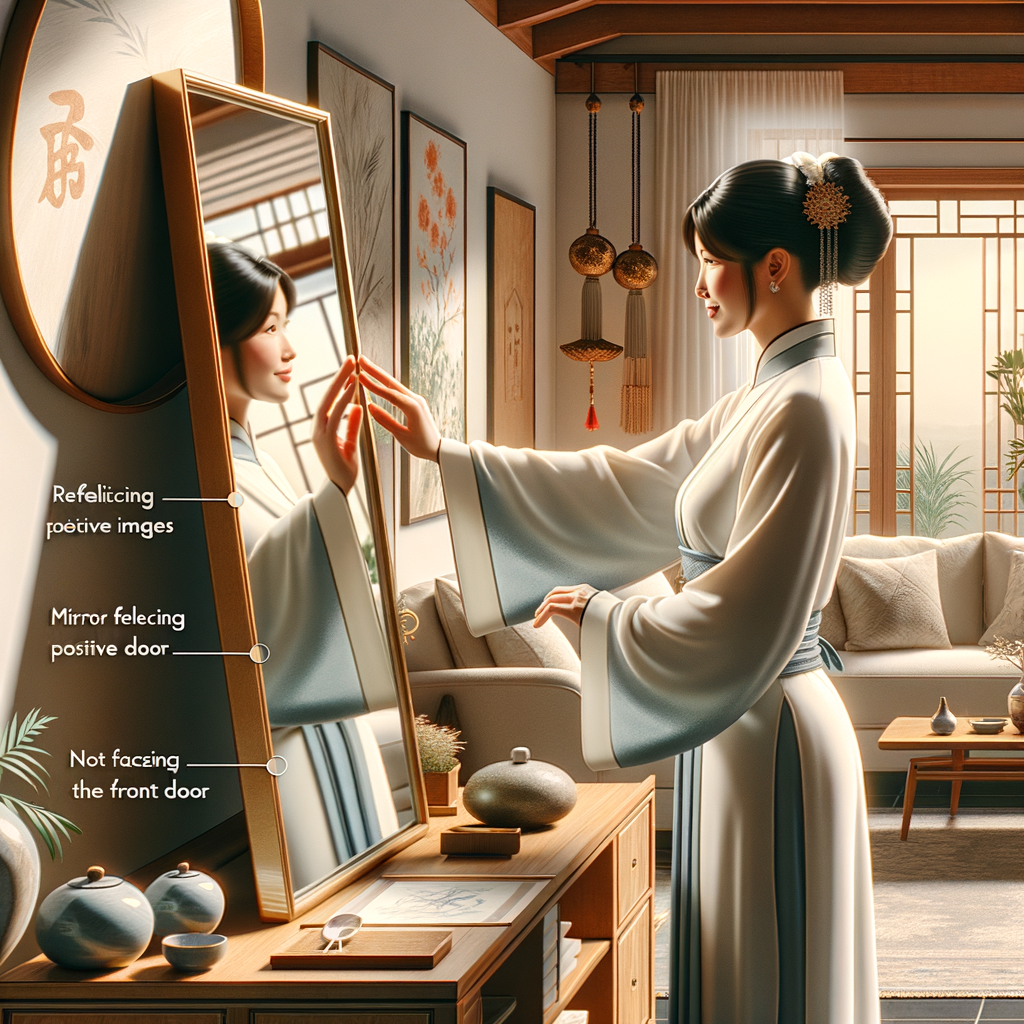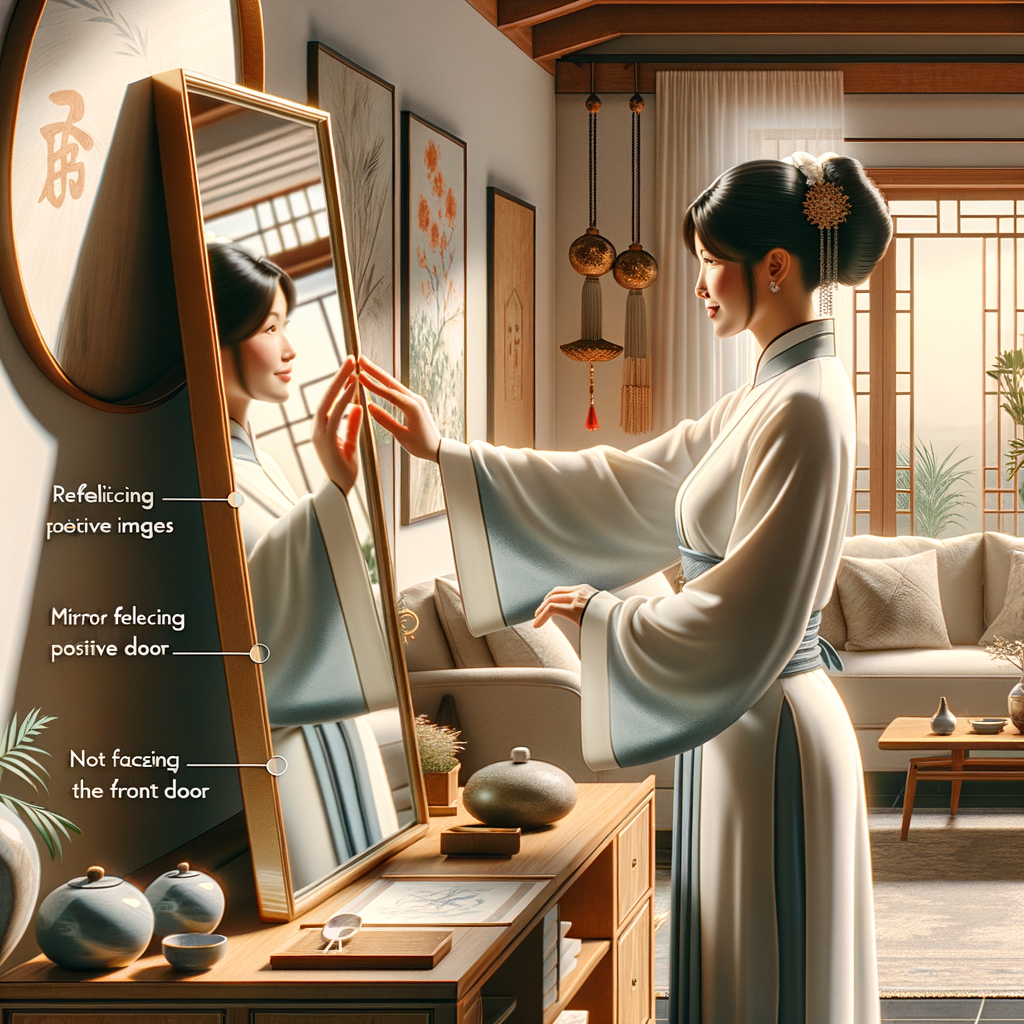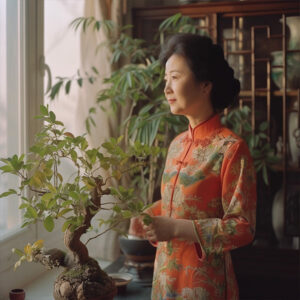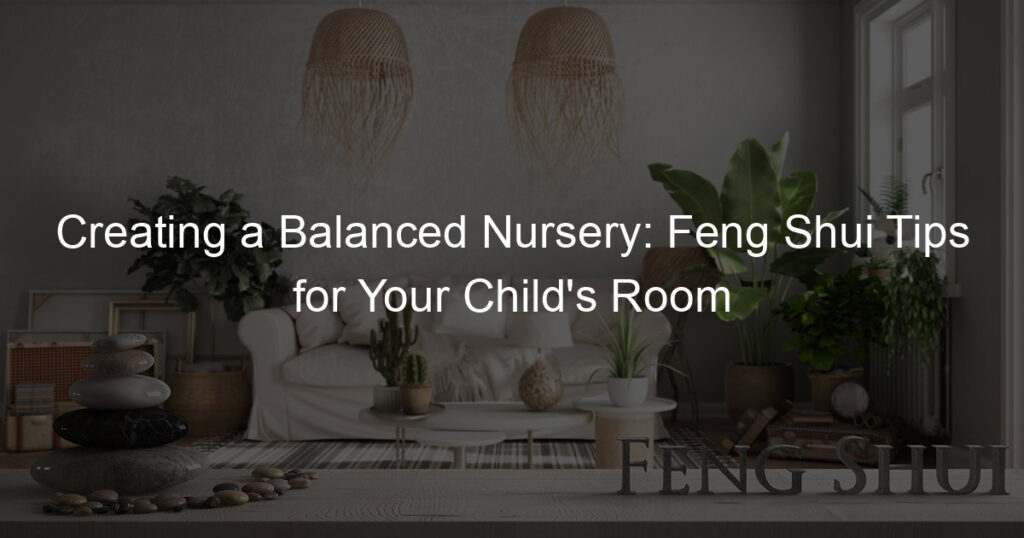
Introduction to Feng Shui Mirror Placement
Have you ever wondered why certain rooms in your home make you feel relaxed, while others seem to drain your energy? The answer could lie in the ancient Chinese art of Feng Shui, specifically in the placement of mirrors. In this blog post, we will explore the importance of mirror placement in Feng Shui and how it can impact the energy flow in your home.
- Understanding the importance of mirror placement in Feng Shui
- How mirrors can impact energy flow in your home
Mirrors play a crucial role in Feng Shui. They are not just decorative items but powerful tools that can manipulate the energy flow in your home. According to Feng Shui principles, mirrors can reflect, absorb, and redirect energy. They can expand space, attract abundance, and even deflect negative energy. Therefore, where and how you place your mirrors can significantly influence the Feng Shui of your home.
In Feng Shui, it’s believed that mirrors can either enhance or disrupt the energy flow, also known as ‘Chi,’ in your home. A well-placed mirror can double the abundance, reflect beautiful views, and bring in more light. On the other hand, a poorly placed mirror can reflect clutter, magnify problems, and even bounce off positive energy. Therefore, understanding how to place mirrors correctly is key to harnessing their positive effects and avoiding potential pitfalls.
In the following sections, we will delve deeper into the key principles of Feng Shui mirror placement, practical tips, guidelines for different rooms, and common mistakes to avoid. So, stay tuned to master the art of Feng Shui mirror placement and transform your home into a harmonious and positive space.
Key Principles of Feng Shui Mirror Placement
In the practice of Feng Shui, mirrors play a significant role. They are not just decorative items but powerful tools that can alter the flow of energy in a space. Understanding the key principles of Feng Shui mirror placement can help you harness their power and create a more harmonious living environment.
- The role of mirrors in Feng Shui
- Basic Feng Shui mirror principles to follow
Mirrors in Feng Shui are known as the ‘aspirin of Feng Shui’ due to their ability to cure many Feng Shui challenges. They are used to reflect, expand, and redirect energy. Mirrors can double the abundance, reflect away negative energy, and create a sense of spaciousness.
There are several basic principles to follow when placing mirrors in Feng Shui. First, mirrors should be placed intentionally and not randomly. They should be used to reflect positive views and aspects of the room. Second, mirrors should be kept clean and clear to ensure they reflect light and positive energy. Third, the size and shape of the mirror matter. Large mirrors are powerful, while round or oval mirrors are considered more harmonious than square or rectangular ones.
By understanding the role of mirrors in Feng Shui and following these basic principles, you can use mirrors to enhance the positive energy in your home and improve your overall well-being.
Feng Shui Mirror Placement Rules
Understanding the rules of mirror placement in Feng Shui can help you create a more harmonious and positive environment. Here are three key rules to follow:
- Rule 1: Avoid placing mirrors facing the front door
In Feng Shui, the front door is considered the mouth of the home, where all energy enters. If a mirror is placed facing the front door, it is believed that the incoming positive energy will be reflected back out. This can lead to a loss of good fortune and opportunities. Instead, consider placing a mirror perpendicular to the door to invite and circulate positive energy.
- Rule 2: Do not place mirrors facing each other
Placing mirrors directly opposite each other creates what is known as an “infinity reflection,” which can cause confusion and imbalance in the energy flow of your space. This endless reflection can create a cycle of uncontrolled energy, leading to restlessness and anxiety. To maintain a calm and balanced environment, avoid this mirror arrangement.
- Rule 3: Avoid mirrors in the bedroom
While mirrors can make a room appear larger and brighter, in Feng Shui, it’s best to keep them out of the bedroom. Mirrors in the bedroom are believed to reflect and amplify energy, which can disrupt sleep. If you must have a mirror in your bedroom, try to position it so it does not reflect the bed or cover it at night.
By following these simple Feng Shui mirror placement rules, you can help ensure a more balanced and positive energy flow in your home.
Practical Feng Shui Mirror Tips
Understanding the principles of Feng Shui can help you create a more balanced and positive environment in your home. One of the most effective tools in Feng Shui is the mirror. Here are some practical tips on how to use mirrors in Feng Shui.
- Using mirrors to expand space
- How to use mirrors to reflect positive energy
Mirrors have a magical ability to make a room appear larger than it is. This is especially useful in small spaces where you want to create the illusion of more room. Place a large mirror on a wall that faces an open space or a beautiful view. The reflection will trick the eye into thinking the room extends further than it does. This technique not only expands the space visually but also brings in more light, making the room feel brighter and more welcoming.
In Feng Shui, mirrors are used to reflect and multiply positive energy, also known as ‘Chi’. To do this, place your mirror in a location where it can reflect something beautiful and uplifting. This could be a lovely piece of artwork, a healthy plant, or a window with a pleasant view. By reflecting these positive elements, the mirror will help to increase the flow of good energy in your home.
Remember, the key to successful Feng Shui is balance and harmony. So, while mirrors can be powerful tools, they should be used thoughtfully and in moderation. Too many mirrors can create confusion and chaos, rather than clarity and calm.
Feng Shui Mirror Positioning Examples
Now that we’ve covered the basics of Feng Shui mirror placement, let’s look at some practical examples. These examples will help you better understand how to apply these principles in your own home.
- Example 1: Mirror placement in the living room
- Example 2: Mirror placement in the dining room
The living room is a common area where family and guests gather. Here, a well-placed mirror can help create a sense of spaciousness and positive energy. Place the mirror on a wall that reflects a beautiful view or a piece of art. Avoid placing it directly opposite the main door or reflecting clutter, as this can bring negative energy into the room.
| Living Room Mirror Placement |
|---|
| Place mirror to reflect a beautiful view or art piece |
| Avoid placing mirror opposite the main door or reflecting clutter |
The dining room is a place of abundance and nourishment. In Feng Shui, a mirror in the dining room can symbolize doubling of food and wealth. Position the mirror to reflect the dining table. However, avoid placing it where it reflects the kitchen or bathroom, as this can symbolize draining away of wealth.
| Dining Room Mirror Placement |
|---|
| Position mirror to reflect the dining table |
| Avoid placing mirror where it reflects kitchen or bathroom |
Remember, the key to successful Feng Shui mirror placement is to reflect positive images and views, while avoiding negative reflections. With these examples, you can start to see how these principles can be applied in different rooms of your home.
Feng Shui Mirror Guidelines for Different Rooms
Understanding how to position mirrors in different rooms according to Feng Shui principles can greatly enhance the flow of positive energy in your home. Let’s delve into the specific guidelines for mirror placement in the bedroom and bathroom.
-
Guidelines for Mirror Placement in the Bedroom
In Feng Shui, the bedroom is a place of rest and rejuvenation. Mirrors in the bedroom should be placed thoughtfully to promote a peaceful environment. Here are a few guidelines:
- Do not place a mirror facing your bed. Feng Shui principles suggest that this can lead to restless sleep and drain your energy.
- Position the mirror on the wall opposite the bedroom door. This can help to reflect and circulate positive energy around the room.
- Avoid placing a mirror near the window. It may reflect the sunlight and create an overly bright and disturbing environment.
-
Guidelines for Mirror Placement in the Bathroom
The bathroom is a place of cleansing and renewal. Proper mirror placement can help to enhance these qualities. Here are some tips:
- Hang a mirror above the sink. This is not only practical but also helps to reflect light and create a sense of spaciousness.
- Avoid placing a mirror opposite the bathroom door. In Feng Shui, it is believed that this can lead to energy being drained away.
- Do not place a mirror facing the toilet. This can disrupt the energy flow and create a negative environment.
By following these guidelines, you can create a harmonious environment in your home that promotes well-being and positivity. Remember, the key to successful Feng Shui is balance and harmony.
Case Study: Feng Shui Mirror Placement in a Small Apartment
Let’s dive into a real-life example to understand the impact of proper mirror placement in a small apartment. This case study will highlight how Feng Shui principles improved the energy flow and brought about positive changes.
- How proper mirror placement improved energy flow
Our subject lived in a compact, one-bedroom apartment. The living room was small and felt cramped. The bedroom was also tiny, with a large closet door that took up most of the space. The bathroom was the only area that felt spacious, but it was also the least used.
By applying Feng Shui principles, we decided to place a large, round mirror in the living room. This mirror was placed directly across from the window, which allowed natural light to bounce around the room, making it feel larger and more open.
In the bedroom, we placed a smaller, rectangular mirror on the wall opposite the closet. This helped to visually expand the room and break up the monotony of the large closet door. The bathroom already felt spacious, so no additional mirrors were added.
After these changes, the subject reported feeling more relaxed and comfortable in their home. They noticed a significant improvement in the energy flow, making the apartment feel more welcoming and harmonious.
- Key takeaways from the case study
From this case study, we can draw several key insights:
| Insight | Explanation |
|---|---|
| Mirror placement can make a room feel larger | By placing a mirror opposite a window or in a cramped space, you can create the illusion of a larger, more open area. |
| Mirrors can improve energy flow | Properly placed mirrors can help to balance and circulate energy, making a space feel more comfortable and welcoming. |
| Every room is unique | What works in one room may not work in another. It’s important to consider the specific characteristics of each room when placing mirrors. |
In conclusion, this case study demonstrates the power of Feng Shui mirror placement. By considering the unique characteristics of each room and using mirrors strategically, we can improve the energy flow and overall feel of our living spaces.
Common Mistakes in Feng Shui Mirror Placement
While the art of Feng Shui mirror placement can bring balance and positive energy to your home, there are common mistakes that can disrupt this harmony. Let’s explore these pitfalls and learn how to avoid them.
- Mistake 1: Placing mirrors at the end of hallways
- Mistake 2: Using broken or cracked mirrors
Many people make the error of placing mirrors at the end of hallways. In Feng Shui, this is considered a negative practice. The reason is that mirrors reflect energy, and when placed at the end of a hallway, they can bounce energy back and forth, creating a chaotic environment. It’s like playing ping-pong with energy, and it’s not a game you want to play in your home. Instead, consider placing mirrors in a way that they reflect something beautiful and uplifting, like a piece of art or a nice view.
Another common mistake is using broken or cracked mirrors. In Feng Shui, everything in your environment is believed to reflect your life. A broken or cracked mirror can symbolize a fractured self-image or a broken relationship. It’s also believed to scatter energy, creating confusion and chaos. If you have a broken or cracked mirror, it’s best to replace it with a new one. Remember, your mirror should reflect a clear, whole image to promote a positive self-image and harmonious relationships.
By avoiding these common mistakes, you can ensure that your mirror placement aligns with Feng Shui principles, promoting balance, harmony, and positive energy in your home.
Conclusion: Mastering Feng Shui Mirror Placement
In this guide, we’ve explored the art and science of Feng Shui mirror placement. We’ve learned about its key principles, practical tips, and common mistakes. Now, let’s recap what we’ve learned and reflect on the importance of mirror placement in Feng Shui.
- Recap of Feng Shui mirror rules and guidelines
Feng Shui mirror placement is not just about aesthetics; it’s about creating balance and harmony in your space. Remember, mirrors should reflect positive images and should not be placed facing the door or window. They should also be kept clean and unbroken. In different rooms, different rules apply. For instance, in the bedroom, it’s best to avoid mirrors, while in the dining room, they can bring abundance and wealth.
- Final thoughts on the importance of mirror placement in Feng Shui
Mirror placement in Feng Shui is a powerful tool that can significantly affect the energy flow in your home or office. When used correctly, mirrors can enhance positive energy, deflect negative energy, and create a sense of spaciousness. They can help you achieve a more balanced, peaceful, and prosperous living environment.
Mastering Feng Shui mirror placement requires understanding, practice, and patience. But once you get the hang of it, you’ll see the positive changes it can bring to your life. As the ancient Chinese proverb says, “A journey of a thousand miles begins with a single step.” So, take that first step today and start harnessing the power of Feng Shui mirrors!














